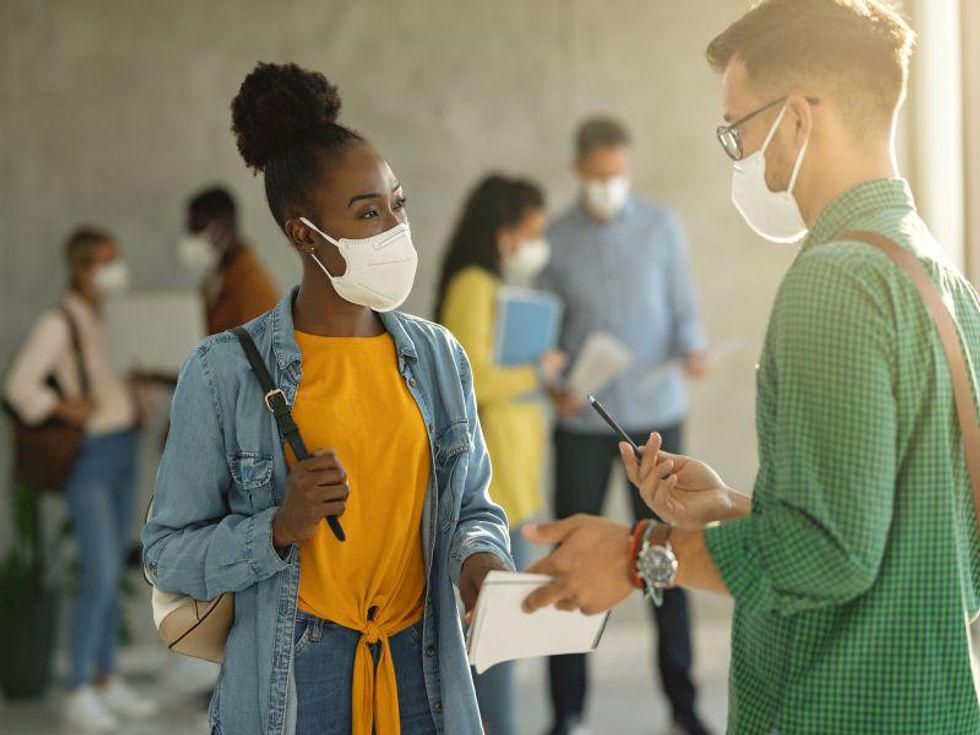FRIDAY, July 2, 2021 (HealthDay News) — The Delta variant of COVID-19 is upending any return to normalcy in some parts of the United States, with locales like Los Angeles County urging vaccinated folks to once again don masks indoors.
Infectious disease experts said these places are acting with an abundance of appropriate caution, given that the Delta variant is more transmissible and potentially more dangerous.
But the danger to any one individual may rely on his or her vaccination status.
Delta doesn’t pose any significant risk of illness to people who are vaccinated, the experts stressed. But there’s a chance they could get a “breakthrough infection” and spread it to others, even if their own infection results only in the sniffles or no illness at all, the experts said.
The Delta variant, which originated in India, is 50 to 80 times more transmissible than the original Alpha strain of COVID-19, according to Dr. Tina Tan. She is a professor specializing in pediatric infectious diseases at Northwestern University’s Feinberg School of Medicine, in Chicago.
So, “even if you are vaccinated or if you had COVID in the past, you might still be able to get this particular infection and transmit it, but you yourself might not get that sick from it,” Tan said.
As for masks, “we know that masking works,” she said.
“It doesn’t matter which variant, we know that masking works, especially in an indoor setting. People need to realize the pandemic is not over,” Tan said. “They need to still continue to be cautious.”
The World Health Organization (WHO) recently reiterated that everyone should wear masks, and countries like Israel have reinstituted mask requirements as infections with the Delta variant increase. Some cities in Australia have initiated fresh lockdowns over the Delta variant, while countries like Malaysia have extended their stay-at-home orders.
The U.S. Centers for Disease Control and Prevention announced in May that fully vaccinated Americans could forgo masks in most settings, and earlier this week its director, Dr. Rochelle Walensky,, stood by that advice in multiple television appearances.
But Walensky also said that local policymakers need to have a free hand in protecting their communities.
“Those masking policies are not to protect the vaccinated — they are to protect the unvaccinated,” Walensky said on NBC’s “Today” show, noting that “everybody should consider their own situation if they would feel more comfortable wearing a mask.”
The evidence suggests that people vaccinated against COVID-19, particularly if they received the Pfizer or Moderna vaccines, will be protected against this new strain, experts said.
“I am not aware of any evidence that fully vaccinated individuals need to wear masks as protection against the Delta variant,” said Dr. Amesh Adalja, a senior scholar at the Johns Hopkins Center for Health Security, in Baltimore. “The data supports the notion that fully vaccinated people, especially those vaccinated with the mRNA vaccines, are highly protected against this variant.”
Dr. Vivek Cherian, of the University of Maryland’s St. Joseph Medical Center in Baltimore, agreed that “there’s a very, very low chance of getting breakthrough infections” from the Delta variant in fully vaccinated people.
“If you do, there’s also a very low chance you’re going to be symptomatic and almost zero chance of being hospitalized,” Cherian said.
But Delta’s high level of infectiousness means it poses a greater risk to unvaccinated people, particularly in parts of the United States where vaccination rates have lagged, he added.
Cherian said he’s also concerned about the risk to people who are only halfway through their COVID-19 shots.
“Some people have a sense of security when they’ve only received one of the two doses,” he said. “The coverage isn’t that great with that. There’s still a decent chance you can get infected.”
The muddled mask messaging is due in part to the fact that each individual public health agency is playing to a different audience, Cherian said.
“The WHO essentially has to address the entire world. Every country has different rates of vaccination. Even in the United States, every state and every county has different rates of vaccination,” Cherian said. “So it’s very hard to come out with an overarching recommendation, and if you do come out with one, it’s always best to err on the side of caution.”
More information
The U.S. Centers for Disease Control and Prevention has more about COVID-19 variants.
SOURCES: Tina Tan, MD, professor, pediatric infectious diseases, Northwestern University Feinberg School of Medicine, Chicago; Amesh Adalja, MD, senior scholar, Johns Hopkins Center for Health Security, Baltimore; Vivek Cherian, MD, University of Maryland St. Joseph Medical Center, Baltimore
Copyright © 2026 HealthDay. All rights reserved.

